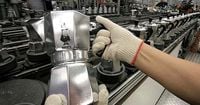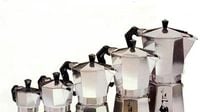Bialetti, an iconic symbol of Italian coffee culture, is set to undergo a significant ownership change as Chinese interests take control of the company. On April 16, 2025, Nuo Capital, a Luxembourg-based firm led by Chinese magnate Stephen Cheng, finalized the acquisition of 78.567% of Bialetti's shares, marking a pivotal moment in the brand's history.
The acquisition comes as part of a broader strategy to revitalize Bialetti, which has struggled financially in recent years. Following the completion of the acquisition, a mandatory takeover bid (OPA) will be launched for the remaining shares, with an estimated price of no less than 0.467 euros per share. The implicit value of the acquisition is no less than 42,634,000 euros, according to company reports.
Francesco Ranzoni, chairman of the board of directors of Bialetti Industrie, expressed optimism about the future, stating, "The entry of Nuo represents a strategic lever to further strengthen the brand and consolidate its position in foreign markets." Ranzoni highlighted the challenges faced by Bialetti in recent years but emphasized the company’s commitment to innovation and maintaining the essence of Italian craftsmanship.
As part of the acquisition, Nuo Capital has signed two key sales contracts: one with Bialetti Investimenti and Bialetti Holding for the purchase of 59.002% of shares for approximately 47.3 million euros, and a second agreement with Sculptor Ristretto Investment for an additional 19.565% for 5.731 million euros. Together, these deals will allow Nuo Capital to secure a controlling stake in Bialetti, with the closing expected by the end of June 2025.
Tommaso Paoli, CEO of Nuo Capital, described the acquisition as a "significant and beautiful challenge," positioning Bialetti for new growth opportunities. He noted that since 2016, Nuo Capital has invested over 400 million euros in Italian companies, aiming to enhance their international presence while preserving their unique identities.
Bialetti, founded in 1919 by Alfonso Bialetti in Crusinallo, has long been a cornerstone of Italian coffee culture, particularly known for its iconic Moka coffee maker. Despite its storied history, the company has faced significant financial difficulties, leading to a debt restructuring agreement with several banks in 2021.
The restructuring plan includes refinancing existing debt through a combination of junior and senior loans, totaling up to 75 million euros, which will be facilitated by various financial institutions, including Banco BPM, Bper Banca, and Amco Asset Management Company. This financial strategy aims to significantly reduce Bialetti's debt burden while ensuring the company remains competitive in the global market.
In addition to financial restructuring, the new ownership structure will see Egidio Cozzi continue as CEO, ensuring continuity in leadership during this transitional phase. The new Board of Directors will comprise seven candidates, including representatives from both the sellers and the buyer, which aims to balance interests and maintain strategic oversight.
Following the announcement of the acquisition, Bialetti’s stock on the Milan Stock Exchange surged by 59.5%, reflecting investor confidence in the new direction under Nuo Capital. The rise in share price indicates a renewed interest in the brand, which has been synonymous with Italian coffee culture for generations.
Nuo Capital's acquisition of Bialetti is not just a financial transaction; it represents a cultural shift as the brand transitions from Italian to Chinese ownership. This change has sparked discussions about the implications for the "made in Italy" label and how Bialetti will navigate its identity in a global marketplace increasingly influenced by international investors.
Cheng, who has previously invested in other prestigious Italian brands, is known for his commitment to maintaining the integrity of traditional craftsmanship while seeking international growth. His vision for Bialetti includes leveraging its historical significance to expand its reach beyond Italy, aiming to introduce the beloved Moka to new markets and consumers.
As Bialetti embarks on this new chapter, the company faces both challenges and opportunities. The integration of Nuo Capital’s resources and expertise may provide the necessary support for Bialetti to innovate and adapt to changing consumer preferences, particularly in the competitive coffee market.
In conclusion, the acquisition of Bialetti by Nuo Capital marks a significant turning point for the brand, blending Italian heritage with Chinese investment. As the company prepares for its upcoming takeover bid and potential delisting from the Milan Stock Exchange, stakeholders will be watching closely to see how Bialetti navigates this transition and strives to uphold its legacy while embracing new opportunities for growth.






